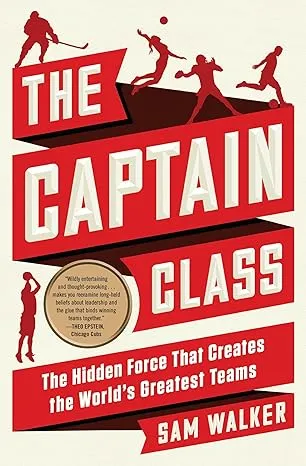About this book
Five Key Takeaways
- Great teams thrive with strong, accountable captains.
- Captains foster a culture of unity and collaboration.
- Relentless effort from captains drives team performance.
- Effective communication enhances trust and teamwork.
- Emotional control is essential for successful leadership.
-
Captains Drive Team Chemistry
Great captains are pivotal in creating team cohesion. They hold players accountable, communicate openly, and instill mutual respect within the group (Chapter 1).
These leaders foster interpersonal bonds, which makes teammates feel connected and driven toward a common goal beyond just winning games.
Team chemistry helps players perform beyond individual potential. A shared sense of responsibility naturally pushes everyone to give their best effort.
This is especially evident in high-pressure situations where teams must function as a unit, not a collection of individuals.
Captains like Bill Russell strengthened team values, proving that emotional connection can be as vital as technical skill in sports.
Teams with strong chemistry thrive when stakes are high because the players trust their captain’s leadership and the culture they’ve cultivated.
Without a captain driving this unity, teams often crumble under pressure, even if they have exceptional individual talent.
-
Winning Demands a Culture Shift
One problem with some teams is their focus on individual performance rather than creating a culture of shared success.
When individual accolades dominate, trust and collaboration take a backseat, weakening long-term team performance.
Without a unifying culture, even talented teams fail to overcome adversity or maintain consistent excellence.
The author believes captains play a transformative role in shifting focus toward team-oriented goals and values (Chapter 2).
In turn, this aligns team members with a collective purpose, fostering a resilient, winning mindset that transcends individual metrics.
Captains achieve this through small, consistent actions like reinforcing accountability and modeling teamwork, not necessarily grand gestures.
The emphasis here is that leadership isn’t an occasional act but a continuous effort to improve team dynamics.
Teams that succeed long-term embrace this shift, showing that winning stems from unified effort rather than isolated brilliance.
-
Emotional Regulation Inspires Consistency
The world’s greatest captains master emotional control, especially during high-stake challenges when teams need steady leadership (Chapter 5).
This ability reassures teammates and keeps the group focused, preventing stress or negativity from spreading and causing chaos.
Captains like Jérôme Fernandez skillfully compartmentalized personal turmoil to lead their squads, showing resilience under immense pressure.
When captains lose control, morale dips, and teammates feel disoriented. Composure, however, unifies and energizes the group.
Positive emotional regulation fosters trust, proving that effective leadership balances authenticity with maintaining calm authority.
This matters in competitive settings where mental toughness often decides outcomes over raw skill or mechanics.
Teams united through this stability perform better because they can navigate stress as a cohesive unit, avoiding panic.
Ultimately, emotional resilience exemplified by captains sets the tone for a success-driven, composed culture within teams.
-
Prioritize Actions Over Speeches
In teams, impactful leadership doesn’t rely on motivational speeches but emphasizes actionable, everyday interactions instead.
Tier One captains avoid grand orations. Instead, they support teammates consistently, creating trust through presence and accessibility (Chapter 6).
They communicate in small but meaningful ways—through gestures, eye contact, and encouragement during routine activities.
This approach ensures teammates feel seen and valued, fostering an open environment where healthy collaboration flourishes.
By emphasizing consistent communication, you can strengthen bonds and resolve issues before they escalate into larger conflicts.
Teams benefit from this environment because it encourages full participation and reinforces trust in the leader's vision and efforts.
Adopting this method prevents the disconnect that often arises from top-down leadership styles, ensuring collective success.
-
Champion Positive Dissent
Effective leadership requires challenging authority when necessary, ensuring the team’s well-being and progress are not compromised.
Captains like Valeri Vasiliev embraced positive dissent by defending teammates against ineffective leadership (Chapter 8).
You can practice this by respectfully voicing concerns about policies or practices that hinder your group’s growth and unity.
Standing up for what’s right reinforces the trust of those you lead, proving that their needs and opinions matter deeply.
This builds loyalty within teams, as members feel protected and heard, enhancing overall cohesion and productivity.
Ignoring dissent, on the other hand, risks alienating team members, leaving unresolved conflicts to erode camaraderie and morale.
By balancing respect for authority with constructive questioning, you strengthen the team’s identity and shared vision for success.
-
Relentless Effort Trumps Pure Talent
Talent alone often fails to guarantee consistent success. Effort, grit, and resilience define what separates good captains from great ones.
A lack of relentless effort creates complacency, undermining progress and demotivating team members to push themselves further.
Great captains inspire others by pushing boundaries, particularly in adverse situations where perseverance holds greater value than skill (Chapter 4).
These captains demonstrate unwavering drive, motivating their teams to meet that same level of effort with pride and commitment.
Observers of tireless leadership often feel compelled to avoid letting their captains down, creating ripple effects throughout the group.
This quality built lasting legacies for figures like Maurice Richard, whose persistence under challenging circumstances inspired generations.
In short, tenacity is infectious. Teams with leaders who exhibit this relentless drive tend to outperform skill-focused or passive groups.
-
Flawed Leaders Skew Leadership Views
Idolizing captains like Roy Keane, who often led recklessly, distorts perceptions of effective leadership (Chapter 9).
Their emotional imbalance—overshadowing qualities like humility—creates false standards for future leaders to imitate.
This fixation neglects crucial traits such as selflessness or communication, diminishing genuine team-oriented leadership qualities.
Such flawed captains often command through aggression, breeding team discord, or stifling innovation. Their traits harm rather than help cohesion.
Overemphasizing their intensity blinds organizations to nuanced leadership styles focused on collective growth and accountability.
Organizations that continue glorifying this outdated view risk developing dysfunctional internal dynamics and suboptimal team structures.
Reassessing this admiration remains essential in creating and supporting captains who cultivate positive, impactful, and lasting leadership.




















